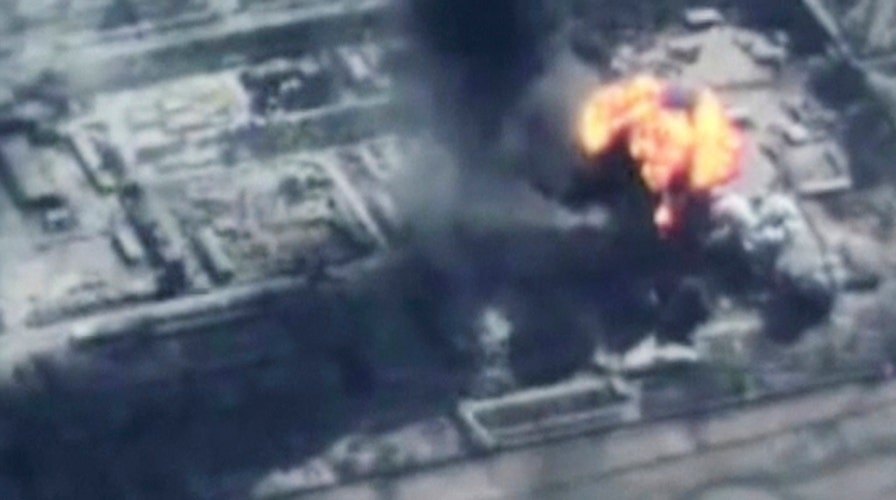New coalition air strikes pound ISIS in Syria and Iraq
UAE forces rejoin coalition for mission against ISIS
Syrian President Bashar Assad says that his government has received information about airstrikes carried out by a U.S.-led coalition against the Islamic State terror group, but has denied any direct coordination between the parties.
Assad made the claims in an interview with the BBC that was broadcast Tuesday. He said that messages about the airstrikes were conveyed to Damascus by third parties, including the Iraqi government.
"Sometimes they convey [a] message, [a] general message, but there's nothing tactical," Assad said. "There is no dialogue. There's, let's say, information, but not dialogue."
Many members of the coalition, which includes four Arab countries, have urged Assad to relinquish his position since the beginning of Syria's bloody civil war in 2011. However, Syria's ruler has clung grimly to power despite heavy fighting that has caused the deaths of an estimated 200,000 people.
Now, coalition jets share the skies with Assad's own air force, which also targets the terror group, commonly known as ISIS. However, Assad told the BBC that he would not formally join the coalition, which includes Jordan, Saudi Arabia, Bahrain, Qatar, and the United Arab Emirates.
"No, definitely we cannot and we don't have the will and we don't want, for one simple reason -- because we cannot be in an alliance with countries which support terrorism," Assad said, in an apparent reference to the moderate Syrian rebels, which are supported by the United States. Assad also said that he would refuse to discuss action against ISIS with U.S. officials because, he said, "they don't talk to anyone, unless he's a puppet.
"And they easily trample over international law, which is about our sovereignty now, so they don't talk to us, we don't talk to them."
Assad also dismissed efforts to arm and train a force of moderate rebels to fight ISIS on the ground in Syria as a "pipe dream."
The Wall Street Journal reported last month that the program to arm and train Syrian rebels, run by the CIA, had been beset by issues, including weapons shipments that were between 5 and 20 percent of what was requested by rebel commanders.
Meanwhile, the United Arab Emirates launched airstrikes Tuesday against ISIS from an air base in Jordan, marking its return to combat operations against the militants after halting the strikes late last year.
The Gulf federation's official WAM news agency quoted the General Command of the UAE Armed Forces as saying that Emirati F-16s carried out a series of strikes Tuesday morning.
The fighters returned safely back to base after striking their targets, the statement said. It did not elaborate, nor did it say whether the strikes happened in Syria or Iraq. The militants hold roughly a third of each country in a self-declared caliphate.
American officials say the Emirates halted airstrikes in December after a Jordanian pilot, Lt. Muath al-Kaseasbeh, was captured when his plane crashed behind enemy lines. Al-Kaseasbeh was later burned alive by the militants.
The Emirates had not commented on the suspension, and Tuesday's statement was the first confirmation it had restarted combat operations.
There was also some good news from the region Monday, as coalition officials said that Kurdish Peshmerga fighters had seized three bridgeheads on the west bank of the Tigris River from ISIS fighters north of Mosul. The attack was supported by four coalition airstrikes that had provided close air support.
"This most recent Peshmerga operation is yet another example of how Daesh [the Arabic acronym for ISIS] can be defeated militarily using a combination of well-led and capable ground forces,” said Lt. Gen. James Terry, commander of the Combined Joint Task Force Operation Inherent Resolve.
However, a senior U.S. official told Fox News that any campaign to retake Mosul, Iraq's second-largest city, from ISIS was not "weeks away", contradicting statements made over the weekend by Gen. John Allen, President Obama's special envoy to the anti-ISIS coalition.
"We don’t want this to be a fair fight, we need to build up the Iraq military first," the official said.
Elsewhere, Reuters reported, citing Syrian activist groups, that ISIS had withdrawn some of its fighters and equipment from areas around the northwestern Syrian city of Aleppo, a hotbed of anti-Assad feeling. The U.K.-Syrian Observatory for Human Rights said that ISIS had redeployed some of its forces to do battle against Kurdish fighters and mainstream rebels further east, but had not completely withdrawn from the area.
The Observatory estimates that approximately 70 ISIS fighters have been killed in an escalation of coalition airstrikes since the group released video last week of a Jordanian pilot being burned alive.
Fox News' Lucas Tomlinson contributed to this report.

